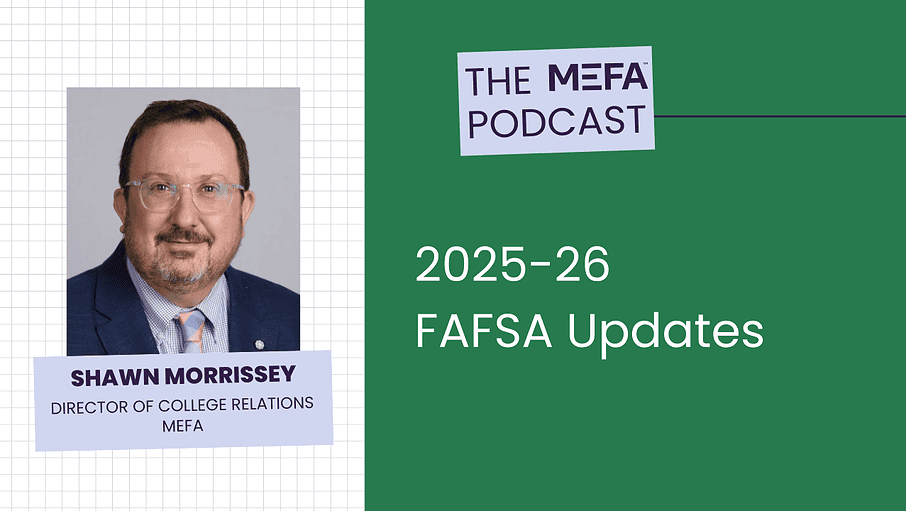

Resources Mentioned in this Episode
Shawn Morrissey: [00:00:00] The good news for this year, I said last year they didn’t have time to do testing. They’re doing a lot of testing this year. So they have three phases of beta testing for this year. So they’re starting really small with just a few schools and then with each round of the testing they’re getting bigger.
And they’re not just testing that the student process, but they’re testing the whole process through sending data to schools as well. When the FAFSA does become live on or before December 1st they’ll have, it’ll be fully functional. So students will be able to fill out that FAFSA and it’ll be the regular cycle where the school should get that data within a few days of the student filling out the FAFSA, unlike last year where they might have had to wait months for that data to get to the schools.[00:01:00]
Jonathan Hughes: Hi everyone and welcome to the MEFA Podcast. My name is Jonathan Hughes.
Julie Shields-Rutyna: And I’m Julie Shields-Rutyna.
Jonathan Hughes: Julie, how are you?
Julie Shields-Rutyna: Hi Jonathan, I’m great.
Jonathan Hughes: All right, we are going to be talking about everyone’s favorite topic. Today, the FAFSA, right? And so why are we going to be talking about the FAFSA? Because it’s October.
That’s why. And that means that the FAFSA is out, right? No, it won’t be available until December 1st this year. So another delay for the FAFSA this year, but we can talk about that later with our guest on the show, MEFA’s own Shawn Morrissey, because he’s our internal FAFSA expert. So we’re going to do that in just a few minutes.
So everybody who’s clamoring to hear about what they can expect about the FAFSA this year. We’re going to get to it really quickly but before we hand this thing over to Sean, we have some advice and some ways that we can help families who are expecting to file the FAFSA this year. Don’t we, Julie?
Julie Shields-Rutyna: We do. [00:02:00] FAFSA is going to be available on or before December 1st, which is great. A little late, usually it’s October, but that’s okay. So for parents who suffered through the FAFSA delay, And the bugs in the system last year, they are probably thinking, Oh no, here we go again. But we are feeling more optimistic this year. I definitely am. And we’re going to talk to Sean about what some of the reasons why we might feel that way. But one thing we want to stress right away is that high school seniors and their parents can really take One important step. They can take a few important steps, actually. But the one we’ll talk about right this moment is they can go and get their FSA ID right now, so they’ll be ready to file their FAFSA as soon as it opens.
Jonathan Hughes: Now, Julie, what is an FSA ID?
Julie Shields-Rutyna: Yeah, so an FSA ID is basically a username and password. [00:03:00] And, in fact, I think we’re going to be using that terminology going forward because no one really knows what an FSA ID is. But we’re all very used to creating usernames and passwords all over the place. That’s what it is.
It’s a username and password that students and parents need to fill out. Need to have so that they can file the FAFSA. Yeah. So to have, if they have their FSA IDs, when they sit down to do the fafsa, it’s going to, they’re gonna be able to go right in and start the fafsa.
Jonathan Hughes: Yeah. Okay. Sounds simple enough, but let’s get to where it gets complicated. Who needs an F-S-A-I-D?
Julie Shields-Rutyna: Yes. The student always needs an F-S-A-I-D, so they need to go in and create their own. Username, password, FSA ID. And either one or two parents Are going to need an FSA ID.
Jonathan Hughes: Okay. So what does that depend on whether you need one or two?
Julie Shields-Rutyna: Yeah, so if [00:04:00] the student’s parents are married and they have filed their tax return, tax returns jointly, as many couples do, then only one parent needs an FSA ID.
But if that, if they filed separately or they didn’t file at all, then both parents will need their own FSA ID. And if parents are divorced or separated the parent who’s going to do this with the student is the parent who provided the most financial support in the past year. And that’s the one that would need the FSA ID.
It is true that if that parent is remarried, And filed taxes separately from their spouse, that spouse will need an FSA ID, too. There are some cases where two parents will need the FSA ID, and many, hopefully, that will just need one.
Jonathan Hughes: And it really comes down to that filing status, right? Like jointly versus separately or not at all, right?[00:05:00]
Okay good. That gets a little complicated. I can see, why people get confused. But what do you need, what pieces of information do you need to actually get an FSA ID?
Julie Shields-Rutyna: You definitely need an email address. And I have suggested, I was helping some families yesterday, and I suggested an email address that you’re going to have for some time.
So for example, if the student has a high school email address that might go away in a year, Don’t use that one. Try to use one that you’re going to have for a long time. So you need an email address. Everyone needs an email address in their own unique email address. And then you have to put your full name, date of birth, and social security number if you have one.
But you don’t have to have one in order to get an FSA ID. And you want to be just very careful when you’re entering this information and make sure it’s correct, that it matches the exact name, date of birth, Social Security that’s on file at the Social Security Administration. Because after [00:06:00] you complete what you need to get your FSA ID, it’ll be verified with the Social Security Administration and that’s going to take a couple of days.
So about two to three days after completing this process, you’ll get an email notifying you that your FSA ID has been finalized and indeed it has.
Jonathan Hughes: Okay. And then you can go ahead and start your FAFSA. So the FAFSA comes out December 1st. That’s what they’ve told us. It takes about three days or so for the FSA ID to be finalized or verified with the social security administration.
So a few days before December 1st, it would be a good idea to get the ball rolling, but people can do it earlier than that, right?
Julie Shields-Rutyna: They can. And in fact, we encourage that. This is about two months before the FAFSA set to debut and people can go. Yeah. In any time between now and then and set up their FSA IDs.
In fact, we’re hosting an online event on November 14th from four to six where people can come [00:07:00] in. We put you in a breakout room with an expert to help you create the I will share that we had one yesterday and it went very well. And I helped a couple of families both parent and student create their FSA IDs.
And I’d say it takes about 10 minutes or so because, you go in, you put in all of your information and then it has you set up some challenge questions and you, they want to verify you’re who you are. But then you have your FSA ID. And I encourage both parent and student to write it down somewhere, put it somewhere secure so they’ll have it and can access it.
And then they will be right ready to go to. Complete the FAFSA when it’s open in December. And if anyone is interested in finding out about our event, or has any trouble with getting the FSA ID, and wants to come on November 14th, [00:08:00] you can just go to the show notes, and you can find the link to The page on our website that lists that website and you can sign up for that.
Jonathan Hughes: All right. Now, Julie, I’m going to throw a curve ball at you here. And so you mentioned a couple of other things that parents can do to get started or families can do while they’re waiting for the FAFSA to come out. You can talk about some of those.
Julie Shields-Rutyna: Sure. One is MEFA has a lot of events, mefa.org/events. So we have a financial aid 101 overview and we, have that webinar going on almost on a weekly basis. So someone can come in and register for one of those which is live and you can ask your questions or you can just go to the website and watch a video recording of one that we’ve already done.
So that’s great. You can also, Look at your we have an SAI calculator, Student Aid Index Calculator on our website. And some, a family could go in and play around with that, just to get a sense, [00:09:00] maybe after the Financial Aid 101 workshop, get a sense of what you might be expected to pay toward college costs.
That’s a good calculator. And I’m trying to think of anything else. Another thing is here in Massachusetts, we have a number of new financial aid programs. So it would be worth looking into those and just familiarizing yourself with with all of that. But again, if you come to one of our Financial Aid 101 webinars we give you all the information about all of that and then families can do a little more research.
Jonathan Hughes: All right. Sounds good, Julie. Now let’s head over to the MEFA Mailbag. These are questions that have come into us over the past weeks and answered by our college planning team. So remember, if you have any questions, you can email us at [email protected]. You can call us at 800-449-MEFA, and you can also reach us over social media so on Facebook, we’re @MEFAMA, on X we’re on @MEFATweets and on Instagram it’s [00:10:00] @MEFA_MA, our question today comes to us from Jackie who writes. My daughter’s father and I are not married, but we do live together. I know we have to enter in both of our income. However, she has worked a part time summer job in 2023 and this year in 2024. Excuse me. Does her income get included as well? Or is it just our income that gets included?
Julie Shields-Rutyna: So what a great question, Jackie. And actually you’ve given me a few things to talk about here. So I’ll take them first before I actually answer your question. And the first is that you’re correct. You and your daughter’s father, even though not married, because you live together you do both have to be married.
Put your information on the FAFSA. So that’s a question we get often. Not married, but you do live together. So correct. Both parents information will be on the FAFSA. And a second piece, when you talked about your daughter [00:11:00] working in 2023 and 2024, for this FAFSA, which would be for students starting in fall of 2025.
It will be the 2023 income that counts for all of you. So that’s just That’s the most important year, the 2023, that’s the tax return you’ll be using. And yes, both parent income and student income are included on the FAFSA and have to be reported. You, both parents will report your income and the student will also report income.
And again, if you’re, if the student is a senior this year, it’s going to be 2023 income that you’ll be bringing in from the IRS.
Jonathan Hughes: All right, thanks, Julie. One more time, if you have any questions, you can email us at collegeplanningatmifa. org. You can call us at 800 449 MEFA. Our Facebook is @MEFAMA, X @MEFATweets, and Instagram @MEFA_MA.
Just to remind you, we have a bench of college guidance [00:12:00] experts waiting to answer your questions for free. Now, to look ahead. To what we can maybe expect from this year’s FAFSA, let’s welcome back to the show our friend and colleague, MEFA’s Shawn Morrissey.
Shawn Morrissey: Thanks. It’s great to be here.
Julie Shields-Rutyna: All right, Shawn, let’s see. I feel like everybody knows all about this, but just in case they don’t, can you give a brief rundown of what happened with the FAFSA last year and why?
Shawn Morrissey: Yeah, so last year, there were a lot of changes to the FAFSA. formula behind the scenes into the whole format of what was being asked on the FAFSA.
And so all of those changes happening at once caused a lot of delays to the rollout of the FAFSA. So it was what normally would come out on October 1st was then Said to launch sometime in December. They launched very late in December, but [00:13:00] unfortunately it was just up and down. It wasn’t available at all times to students and students could fill out the FAFSA, but it wasn’t being sent to schools right away.
So it was delayed a few months before schools even had access to that data. Once the families did. finished their FAFSA application. So it really delayed the process for a lot of families last year because they had to put all of these changes out they tried to do it very quickly, they didn’t have time to do testing on it, so it was live testing that was going on, and so it really caused some delays.
The good news to what they were trying to do well last year, but hopefully will be better this year, is the application for most families when it works is much simpler, and there is no cost. expanded Pell Grant access for families. So the goal is [00:14:00] very noble. Unfortunately, there were some stumbles in the rollout of it.
Jonathan Hughes: Okay. So looking at the big question, right? What do we know about the FAFSA?
Shawn Morrissey: The good news for this year, I said last year they didn’t have time to do testing. They’re doing a lot of testing this year. So they have three phases of beta testing for this year. So they’re starting really small with just a few schools and then with each round of the testing, they’re getting bigger and they’re not just testing that the student process, but they’re testing the whole process through sending data to schools as well.
When the FAFSA does become live. on or before December 1st they’ll have, it’ll be fully functional. So students will be able to fill out that FAFSA and it’ll be the regular cycle where the school should get that data within a few days of the student filling out the FAFSA, unlike last year where they might have had to wait months for that data to get to the schools.
Julie Shields-Rutyna: All right. So just I’m just going to [00:15:00] clarify. You said a lot there. So we’re giving people information that the federal government has released and they say December 1st. I know there are a lot of colleagues and families that, roll their eyes at that given last year, but let’s just stipulate that there may be delays.
We don’t know. We’re hoping that it will be available December 1st. But what are some reasons to be optimistic about this?
Shawn Morrissey: The reasons to be optimistic, I think, is You know, they haven’t made a lot of changes to the process for this year, and they did that very purposefully. Even though they’re doing beta testing to make sure that if there are any remaining bugs from the process of last year it is the same process as last year, which at the end of, The filing time for last year, less and less families were having any issues with the FAFSA process last year.
So they had worked out throughout the year, a lot of the bugs already. So since they aren’t making a lot of changes there shouldn’t be the delays that there were [00:16:00] last year. That’s why I’m optimistic. I think that they’re really going to be able to meet the December 1st deadline, but I’ve heard from a few other people in the industry that Aren’t quite as optimistic as me, but I still remain optimistic about this.
Jonathan Hughes: So there are tipping, grand FAFSA redesigns aside. I know that what happened last year was a sort of once in a generation thing, but there are typically changes to the FAFSA from year to year. So aside from fixing what went wrong last year. Have they made any significant changes to the FAFSA formula or to any of the questions?
Shawn Morrissey: They haven’t made any changes to the formula except for a few updates to the formula for inflation, which they usually do every year, but there hasn’t been a whole overhaul of the formula like there was to last year. They’ve kept pretty much all of the questions the same. They’ve just changed a little bit of families see [00:17:00] during the interface of filling the FAFSA. So a lot of families last year who the process worked for actually thought They had missed something because they didn’t think that their income information was ever entered on the FAFSA because it was so seamless the way that the interface with the IRS worked that the information was just shared directly with the FAFSA without them even really realizing it.
So they did add this year in a in the interface, a point that shows that the information was shared from the IRS to the FAFSA so that families realized that their data was shared and they didn’t miss sharing their income because a lot of families were worried about that because it just seemed to work too smoothly last year for some families.
So that was one of the issues. And they made a couple of changes to Some other questions. One of them is [00:18:00] there is a question that really did confuse a lot of families last year and was answered incorrectly. And that was there’s a question that comes in. If your parents are unwilling to share their information, you are able to then Not enter in any parental information and you’re eligible for unsubsidized loans only for federal aid and the way that question was written, it looks like a lot of students thought that in order to apply for the unsubsidized loan that they would say yes to this question where what they were really saying, they If they say yes to that means that they’re only applying for the unsubsidized loan, not that they wish to apply for the unsubsidized loan.
So they did make a change that question now defaults to no, but the language is still similar on that. So hopefully families will read [00:19:00] that question carefully and will realize that they’ve In most cases, the answer is no to that question. The only people who should be saying yes to that question are if your parents really are unwilling to share their information and you wish to borrow the unsubsidized loan only through the FAFSA.
Jonathan Hughes: I’m going to cut out that little bit and do a public service announcement just for your section of that answer there.
Julie Shields-Rutyna: Now we know that. One of the big improvements to the process last year was that parents without social security numbers could get an FSA ID and be able to complete the online application.
But there were problems actually completing. The application for those families, what can we expect this year?
Shawn Morrissey: This year that process has been improved and it actually, this improvement came at the very end of processing for last year, very late in the process, I think it happened in. May or June of [00:20:00] last year, and they’ve kept this for this year’s processing where what happens when a contributor without an SSN applies for an FSA ID, it goes through a process where it presents them with questions based on what they have on their credit report.
And if they answer those questions correctly, they’re able to go ahead and FAFSA immediately because their identity is verified. What. then happens is if they’re not able to answer those questions correctly, they’re still able to use that FSA ID to fill out their FAFSA now, and then the schools that they apply to would verify their identity later in the process.
So last year what was happening was if they weren’t able to answer those questions, then They were sent to FSA to put in a ticket, and those [00:21:00] were set in a queue for a long time, and families had to wait and wait to get that verification. That process isn’t happening this year. The schools will take care of that verification later on in the process, so it shouldn’t hold up families being able to use that FSA ID immediately to fill out their FAFSA.
Julie Shields-Rutyna: What are you hearing from colleges? So what are they doing to be ready and to help families who may still be caught up in the process?
Shawn Morrissey: So colleges are really on top of all of this, and they really keep up with what’s happening with the situation. So when there are delays, if something happens to be delayed, they’re very aware of it.
So they, they’re very aware of it. Monitor that very closely, look at their deadlines, see if they have to adjust those based on families not being able to complete the process. There are schools that have. early action or early decision dates that they’ve put other processes in place in order to [00:22:00] get financial aid offers to students in time for them to make decisions knowing that the FAFSA is delayed till December 1st.
So they may have put in an institutional application or there may be another application that they’re requiring for students to fill out if they are in that situation where they need information about their financial aid before December 1st. They’re able to fill out the FAFSA on December 1st. So colleges really are on top of all of this and they’re working diligently to make sure that financial aid offers go out to students as timely as possible.
Jonathan Hughes: I do want to mention that other financial aid form, which is the CSS profile, which is something that other colleges might be basing their institutional aid on rather than the FAFSA. Can you talk about that a little bit? What is that? How is that different from the FAFSA? And what should families?
If they’re hearing FAFSA, it’s not available until December 1st, they should still look and see what colleges they’re [00:23:00] applying to, and if they require this other form, right? Yes,
Shawn Morrissey: Even though the FAFSA is delayed to December 1st, colleges that do require the CSS profile, That’s already available.
So that became available on October 1st. Families should fill that out. We always urge families to check the websites of each college that they’re applying for to see what their requirements are for financial aid because there are different requirements from school to school. All will require the FAFSA but some may require additional applications like the CSS profile, or they may have their own institutional application as well.
So it’s really important to check all of those college websites to make sure that you know what their requirements are and what their deadlines are, because they may differ from school to school as well.
Jonathan Hughes: Alright, Shawn, is there anything else that you would like families and students to know before we go?
Shawn Morrissey: I think the only thing I’d like to say is [00:24:00] that I’m hopeful that We’re not going to have the glitches from last year and that the FAFSA process will be quick for most families. We heard from families that it worked for last year that it took 10 minutes to do. So I’m hopeful that the future for the FAFSA will be that it’s easier for families and that they do have a quick and easy experience on the FAFSA.
And if they do run into problems, there’s lots of help out there for them. They can call the MIFA number. We can help them through that. They can check with the financial aid office at the schools that they’re applying to. They can help them or let them know what the process may be at their school if they run into issues.
There may be workarounds for them. So there’s a lot of help out there if there are issues, but I’m hopeful that it’s going to be a lot easier for students this year.
Jonathan Hughes: Thank you so much for being here, Shawn. I appreciate it.
Shawn Morrissey: Thank you, Jonathan. Thanks, Julie.
Julie Shields-Rutyna: Thank you, [00:25:00] Shawn.
Jonathan Hughes: And that is our show. So I want to thank Shawn Morrissey once again for being here. Julie, thank you so much.
Julie Shields-Rutyna: Thank you, Jonathan.
Jonathan Hughes: And everybody, if you liked what you heard on the show today and you want to hear more from us on planning, saving, and paying for college and career readiness, then please follow the show.
And you can do that wherever you find your podcasts. And please remember to rate and review us. I’d like to thank our producers, Shaun Connolly. I’d like to thank AJ Yee, Lisa Rooney, Lauren Danz, and Meredith Clement for their assistance in getting the show posted. Once again, my name is Jonathan Hughes, and this has been The MEFA Podcast.
Thanks.










